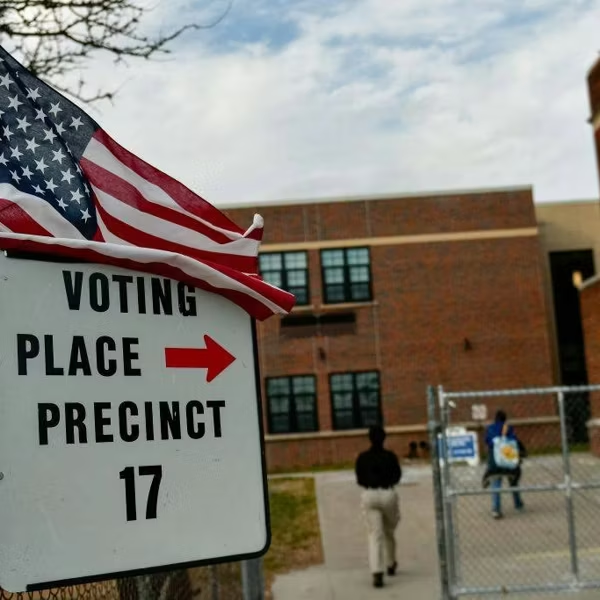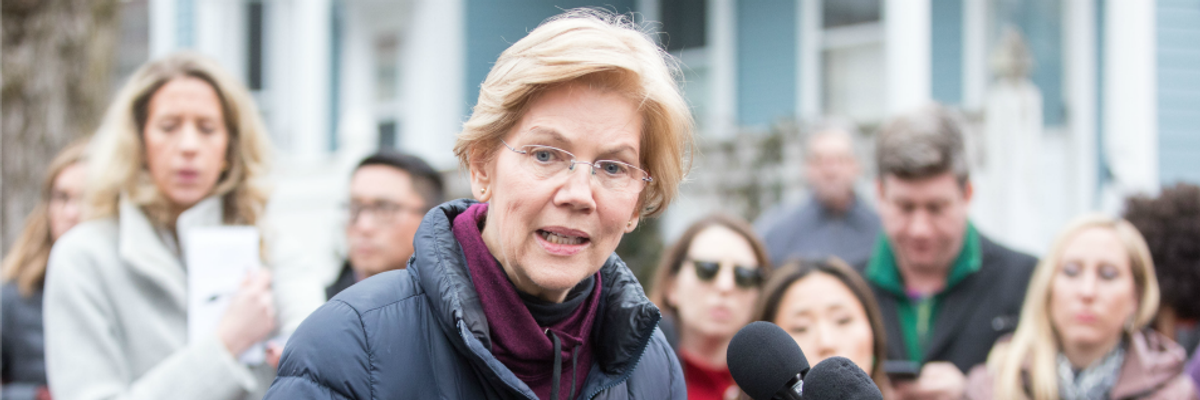In March 18, during a CNN Town Hall, Senator and presidential candidate Elizabeth Warren called for the abolition of the Electoral College. Her response immediately went viral. Mentions of the Electoral College exploded on Twitter. Major outlets published articles detailing and editorializing on Warren's stance and the history of the Electoral College. Soon other candidates in the race went on record in agreement.
Pushing the nation to confront its archaic and undemocratic method of electing the President is a notable achievement. Yet an even more notable moment arrived a couple days later, on March 20, when MSNBC's Chris Matthews, in the midst of a discussion on the Electoral College, displayed a full-screen graphic of states that had joined the National Popular Vote Interstate Compact and began to explain the details of this pro-democracy policy that has achieved remarkable under-the-radar success.
The National Popular Vote Interstate Compact is a clever work-around to the Electoral College. It is an agreement between states to award Electoral College votes to the winner of the national popular vote. The compact would only go into effect once enough states joined such that the states voting together would guarantee that the national popular vote winner would receive a majority in the Electoral College.
The National Popular Vote Interstate Compact is a clever work-around to the Electoral College, and so far 14 states and the District of Columbia are on board.
Currently, fourteen states and the District of Columbia, equalling 189 of the required 270 electoral votes, have entered the compact. Three of these states--Delaware, New Mexico, and Colorado--have joined within the past month, the latter two arguably marking the compact's first swing state participants.
Though billed as a nationwide election, presidential elections are, in reality, decided by, at most, fourteen states: Arizona, Colorado, Florida, Georgia, Iowa, Maine, Michigan, Nevada, New Hampshire, North Carolina, Ohio, Pennsylvania, Virginia, and Wisconsin. The reason? Virtually all states allocate electoral votes in a winner-take-all format--if a candidate wins the majority of votes in a state, that candidate receives 100 percent of the electoral votes. As such, there is no incentive for presidential candidates to campaign in states dominated by one party, even if millions of supporters live there.
In 2016, 95 percent of candidate appearances and 99 percent of campaign spending went to these swing states. Worse still, these states are unrepresentative of the broader population; they are older and whiter and their economic interests--especially relating to energy production--are anomalous. National priorities are subsequently skewed and federal funds get disproportionately allocated to serve swing state needs.
Despite these facts, Electoral College reform efforts, such as the National Popular Vote Interstate Compact or proportional allocation of electoral votes, are virtually never discussed in the media. Warren, by taking a stand for a democracy solution, broke the silence, sparked a much-needed debate about the Electoral College, and spread the word about a concrete policy solution that Americans could immediately act on.
Warren has made specific policies like the compact central to her presidential bid. As Ezra Klein of Vox.com argues, "Warren's candidacy is a bet that elections are about policy rather than identity." And though it's too soon to tell whether this is a viable electoral strategy, the trickle-down effect to policy-driven campaigning--generating media coverage, educating voters and giving them something concrete for which to advocate--has major ramifications, especially for democracy reform.
After all, those fighting for democracy have long been ignored by the media, making the fostering of a national democracy movement more difficult. Improving electoral processes, like climate change, has taken a backseat to the political brinkmanship inside the Beltway. Even the most audacious acts have failed to break the media blackout.
Exactly three years ago, for instance, 150 marchers traveled from Philadelphia to Washington, D.C. Their demand: end voter suppression and get big money out of politics. Then, some 1,300 people, under the auspice of Democracy Spring and Democracy Awakening, conducted sit-ins and were arrested for democracy reform in front of the U.S. Capitol building. (Full disclosure: I was Democracy Spring's deputy communications director.)
Yet, despite this historic action, cable news barely covered the protests. Of the few outlets that reported on the campaign, the focus mostly centered on the celebrities, such as actor Rosario Dawson, who were arrested alongside the protesters.
Media coverage is also difficult to garner for state-level efforts, often requiring high-risk activism. Another group I've long assisted, Pennsylvania-based March on Harrisburg, for example, drew media notice only after it marched from Philadelphia to Harrisburg and shut down hallways in the state capitol through well-orchestrated sit-ins in 2017 to demand a ban on gifts to state legislators.
Though the group continues to get covered when engaging in activism, its founder, Rabbi Michael Pollack, says much more is needed.
"It takes a lot of work to create a sustained discussion of democracy reforms in our halls of power," Pollack tells The Progressive. "If national political candidates used their platforms to raise the profile of democracy reform and educate about solutions, the more sustained and productive our work in defibrillating the heart of our democracy would be."
Democracy reform has flourished even in the context of a difficult political and media environment.
Of course, democracy reform has flourished even in the context of a difficult political and media environment. In just the past year, dozens of state-level democracy reforms have passed across the country.
Four states have entered the National Popular Vote Interstate Compact. Seven states adopted automatic voter registration and four passed same-day registration. Five states attempted to rein in partisan gerrymandering (to varying degrees of success). Denver, Baltimore, and Suffolk County, New York created campaign public financing systems. Florida restored voting rights to more than one million formerly incarcerated felons, in the largest expansions to the franchise in decades (Republicans are in the process of undermining it). Ranked-choice voting made its debut in Maine, to such success that Democrats will likely use the system in multiple states for the 2020 presidential primaries.
And, perhaps most significantly, the For the People Act (H.R.1)--an omnibus package that includes public financing of Congressional elections, nationwide automatic and same-day voter registration, independent redistricting commissions, and much more--passed the House of Representatives on March 8.
These victories were made possible by a nascent yet increasingly powerful democracy movement. Though underreported, state by state, Americans are uniting across demographic and partisan divides to fight for democracy itself. To further advance the movement, however, more public awareness is needed. Presidential candidates, like Warren, therefore should do their part by using their bully pulpits to shape national discourse in favor of reform and direct national attention to advocates' on-the-ground efforts.
And while candidates are primarily concerned with winning the nomination, there is little risk in jumping on the democracy reform bandwagon. Democracy reform is wildly popular and a prerequisite to passing bold progressive policies.




